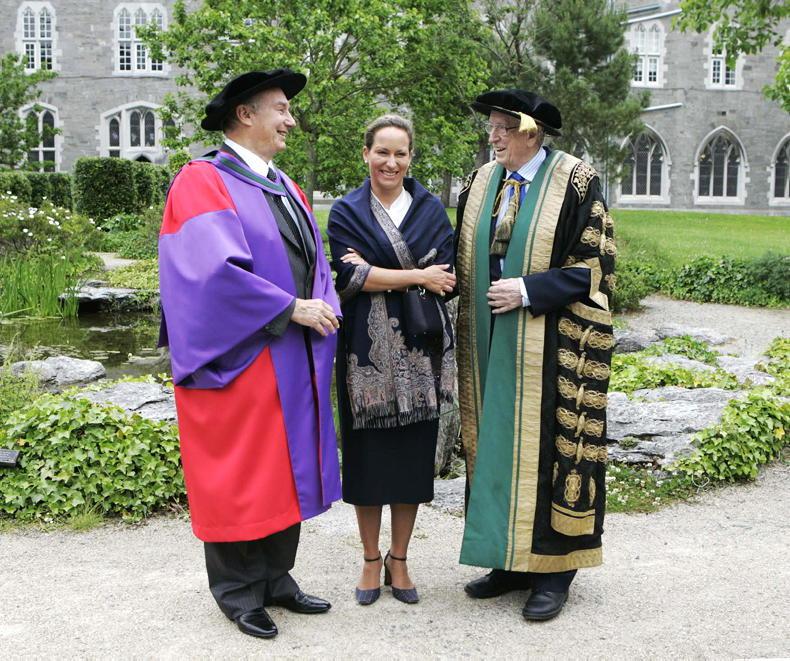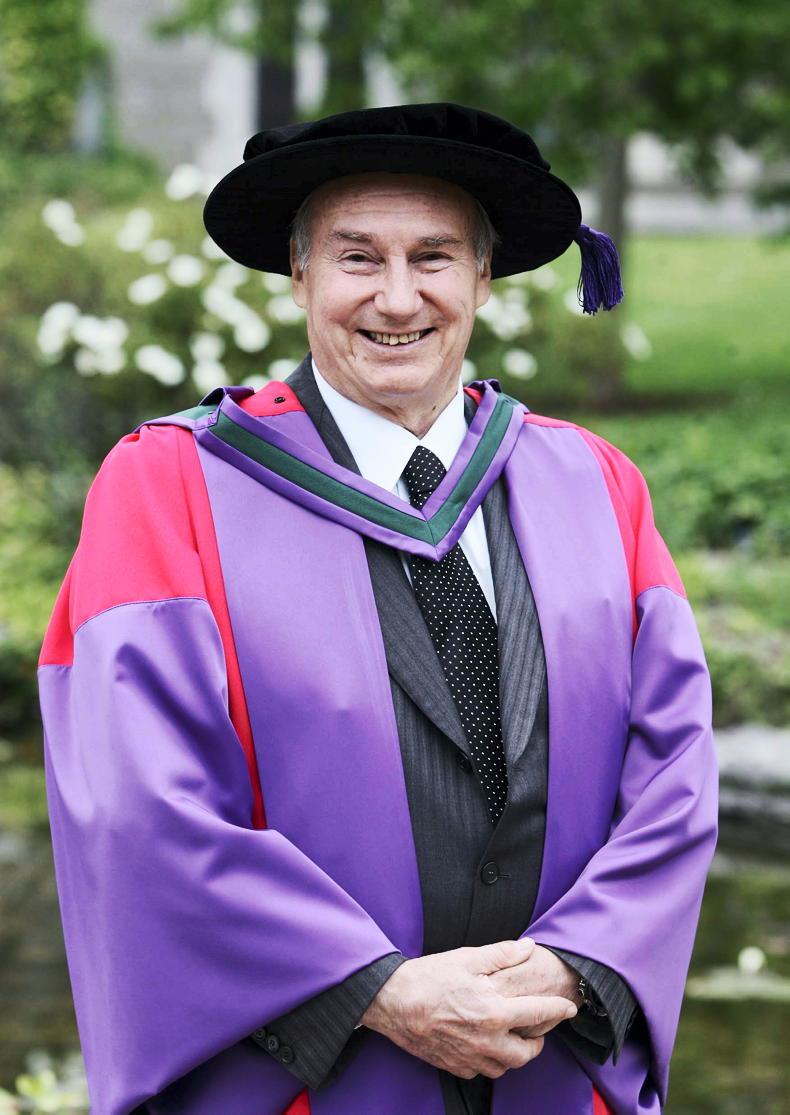2008
His Highness the Aga Khan received an honorary law doctorate from National University of Ireland, Maynooth, on June 30th, 2008. He was cited for ‘outstanding contributions to the elimination of global poverty, the advancement of women, the promotion of Islamic culture, and the furthering of pluralistic values in society’.

The Aga Khan received his honorary doctorate from the Chancellor of the NUI, Dr Garret FitzGerald, and NUI Maynooth President, Professor John Hughes delivered the following citation:
A Sheánsailéar, do mhórgacht, a mhuintir na hOllscoile agus a dhaoine uaisle (Chancellor, your Highness, members of the University and distinguished guests). The National University of Ireland is proud to honour the distinguished career of His Highness Prince Karim Aga Khan IV in his golden jubilee year as Imam of the Shia Imami Ismaeli Muslims. We welcome also his beloved daughter Princess Zahra to this very special ceremony.
His Highness is the first member of the Islamic community to be so honoured in the history of NUI Maynooth, and it is particularly fitting that this University should honour him at this time, steeped as it is in the history of Catholicism in Ireland, but now a vibrant multicultural and multidenominational university.
For the Aga Khan embodies the spirit of understanding, tolerance and ecumenism that should link the great religions of the world. For 50 years, he has been a voice of moderation, a voice of reason in promoting an Islam that embraces and indeed celebrates pluralism and diversity.
The Aga Khan, a direct descendant of the prophet Muhammed, is the son of Prince Aly Khan and Princess Tajuddawlah Aly Khan, and was born on December 13th, 1936, in Geneva.
Early childhood
Aga Khan spent his early childhood in Nairobi, Kenya, and later attended Le Rosey School in Switzerland. He graduated from Harvard University in 1959 with a BA Honours Degree in Islamic History. In 1957, he became 49th Imam (spiritual leader) of the Shia Ismaili Muslims, at the age of just 20.
This followed the death of his grandfather, Sir Sultan Mahomed Shah Aga Khan, who wanted to be succeeded by a young man who has been brought up in the midst of the new age, the atomic age.
His grandfather, a great world statesman who was twice president of the League of Nations, and his father, who was Pakistan’s Ambassador to the United Nations, recognised his intellectual gifts and his potential as a great leader.
For five decades as Imam, the Aga Khan has amply fulfilled his father’s trust and his grandfather’s expectations. In spite of his youth, he quickly established himself firmly not only as spiritual leader, but also as an enlightened guardian of the welfare and progress of the far-flung Ismaili community.
But he has done much more than that. He has become a major activist for civilised humanity and universal values, not only in words but in deeds, and not only in one location, but around the world.
For he believes in the long tradition of Ismaili community values – that education, self-reliance, solidarity and character are the elements that keep a community vibrant and healthy, and lead to enlightenment and dignity.
Over the last 50 years, the Aga Khan has created a number of development programmes and institutions, which have been brought together under the Aga Khan Development Network. All of its programmes are conducted without regard to the faith, origin or gender of the people they serve, guided by the ethic of Islam that requires members of the faith to contribute to improving the quality of all human life.

Network
The Aga Khan Development Network has grown to nine agencies, which include: The Aga Khan Fund for Economic Development, which works to invest in fragile economies and promote entrepreneurial activity in the developing world; the Aga Khan Foundation, which focuses on rural development, health, education, the strengthening of civil society and the environment; the Aga Khan University, which offers courses in the medical and education fields at 10 campuses in Asia, Africa and Europe.
There are also 235 non-profit hospitals, clinics and satellite facilities of the Aga Khan Health Services and more than 300 schools of the Aga Khan Education Services.
Education, above all, has been important to him and his family for a long time. His forefathers founded Al Azhar University in Cairo some 1,000 years ago, at the time of the Fatimid Caliphate in Egypt. Discovery of knowledge was seen by those founders as an embodiment of religious faith, and faith as reinforced by knowledge of workings of the Creator’s physical world.
The form of universities, of course, has changed over those 1,000 years, but that reciprocity between faith and knowledge remains a source of strength.
Several years ago, the Aga Khan launched the University of Central Asia, with campuses in Tajikistan, Kyrgyzstan and Kazakhstan.
The Aga Khan believes that access to education is the key to the future of the region, and he makes it clear that access is open to women as well as men. He is guided by the slogan ‘Strive for knowledge’. The region needs new minds, new thinkers. Only then will it be possible to solve its problems and shape its future.
Throughout his life, the Aga Khan has emphasised the view of Islam as a thinking, spiritual faith: one that teaches compassion and tolerance and that upholds the dignity of man, Allah’s noblest creation.
In the Shia tradition of Islam, it is the mandate of the Imam of the time to safeguard the individual’s right to personal intellectual search, and to give practical expression to the ethical vision of society that the Islamic message inspires.
It was inevitable, then, that the advent of his strong leadership should bring about flourishing systems for welfare, learning, housing and culture.
Patronage
In addition, under the patronage of the Aga Khan, and with his great interest in architecture, dramatic action has been taken in the restoration of some of the great monuments of Islamic civilisation.
The Aga Khan has, of course, close links with Ireland and in particular with Co Kildare. Gilltown is the Aga Khan’s public stud in Ireland, which has housed, among many, the sires Daylami, Kalanisi and Sinndar (the only horse ever to win the Derby, Irish Derby and Prix de l’Arc de Triomphe in the same year).
The area is steeped in Irish history and reflects the lore of the past. Gilltown and the adjoining Sallymount are the sites of two ancient forts dating back, respectively, to Neolithic and Viking times. In the 12th century, they were part of a very large land holding which Dermot McMurrough, King of Leinster, presented to the Cistercian monks of Baltinglass Abbey.
The monks were displaced in the 16th century when Henry VIII, who had declared himself head of the Church in Ireland, enacted legislation in parliament suppressing the monasteries. By the end of the century Gilltown had passed into the possession of the Borrowes family who had received a baronetage from Charles I. Borrowes’ descendants lived at Gilltown into the 20th century.
Gilltown assumed a new role when it became a stud farm, first under Captain RB Brassey and then Viscount Furness. When the farm was acquired by the late Aga Khan’s family, great attention was paid to the overall care and upkeep of these lands. Today Gilltown, Sallymount and Sheshoon are nature sanctuaries with a great variety of wildlife, flowers and rare mature trees. The Aga Khan rightly thinks of these properties as part of Ireland’s national heritage and a legacy for future generations.
Recognition
Over the years, the Aga Khan has received numerous decorations, honorary degrees, and awards in recognition of the various dimensions of his work. He has received civilian decorations on one or more occasions from the governments of France, Portugal, Ivory Coast, Upper Volta, Madagascar, Iran, Pakistan, Italy, Senegal, Morocco, Spain, and Tajikistan.
His Highness has been awarded honorary degrees by universities in Pakistan, Canada, the United Kingdom, and the United States. He has also received numerous awards and prizes from professional organisations in recognition of his work in architecture and the conservation of historic buildings.
In 2006, when accepting the Tutzing Award for his promotion of tolerance, the Aga Khan said: ‘‘Societies which have grown more pluralistic in makeup are not always growing more pluralistic in spirit. What is needed – all across the world – is a new ‘cosmopolitan ethic’, rooted in a strong culture of tolerance.’’ Few people on this planet have contributed more to the promotion of tolerance than our guest of honour here today.
Ladies and gentlemen, I present to you this inspiring leader, great humanitarian, statesman and man of learning and culture, His Highness Prince Karim Aga Khan IV.


 This is a subscriber-only article
This is a subscriber-only article
 It looks like you're browsing in private mode
It looks like you're browsing in private mode






SHARING OPTIONS: